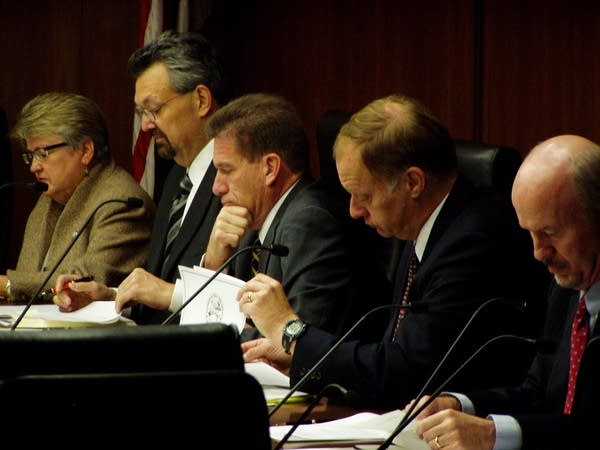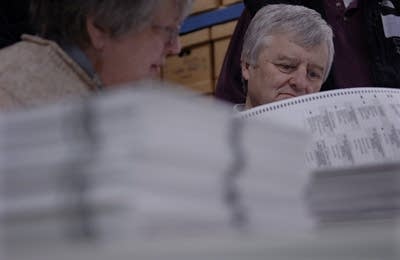Lawmakers look at election reforms, post-recount
Go Deeper.
Create an account or log in to save stories.
Like this?
Thanks for liking this story! We have added it to a list of your favorite stories.

It took elections officials 62 days to sort through nearly 3 million ballots cast on Nov. 4, and Minnesota learned some hard lessons in the process.
Thousands of what may have been legitimate absentee ballots were thrown out. Many voters didn't know how to properly fill out their ballots. And both machines and people made mistakes.

Secretary of State Mark Ritchie is asking for changes that would begin even before the polls open on Election Day. He says the state's election system was strained by a near doubling in absentee voting. Nearly 300,000 people voted absentee, and thousands of ballots were disqualified.
"I want to tackle those 10,000-and-some properly rejected ballots by making that system for absentee voting less confusing, less complicated. So that we have fewer people that are rejected properly, but unfortunately," said Ritchie.
Turn Up Your Support
MPR News helps you turn down the noise and build shared understanding. Turn up your support for this public resource and keep trusted journalism accessible to all.
Local elections officials have suggested the state simply allow early voting, at regular polling booths, using regular ballots and vote counters. That would eliminate much of the paperwork that tripped up voters last fall.
Election managers like Joe Mansky in Ramsey County have also suggested making the state's voter registration system automatic, tying it to driver's licenses, for instance. He says it would offer a number of advantages.

"We obviously get to register a very large number of people who are currently unregistered," said Mansky. "Second, we get rid of the redundant databases that we now operate between the counties, Secretary of State and the Department of Public Safety. And third, we have a more verifiable, more accurate database of voters."
Automatic registration might also ease the next step in the process -- the actual voting.
Officials say early voting and automatic registration might lighten the workload for election judges, and put more attention on the more time-consuming parts of the process, like absentee voting. At least 1,300 absentee ballots were mistakenly thrown out on Election Day.
The close U.S. Senate election has also brought new attention to Minnesota's post-election process -- for instance, the role of the State Canvassing Board.
"I want to tackle those ... rejected ballots by making the system for absentee voting less confusing, less complicated."
The Canvassing Board has largely been a formality in the past. State Sen. Ann Rest, DFL-New Hope, says the state would benefit from making the board's role clearer in future disputed elections.
Rest heads the Senate Government Operations Committee, and plans to offer a number of election reform proposals this year.
"What precise authority do we want to give the Canvassing Board, and are they judging the merits of a ballot or just the form of how it's presented?" said Rest. "Like, 'there's a stray mark or not a stray mark,' as opposed to, 'did they vote for this person or not vote for this person?'"
Republican lawmakers also question the process. Rep. Tom Emmer, R-Delano, says putting Supreme Court justices on the Canvassing Board forces them to bow out of the later, and binding, legal process that follows a recount.
He adds the board's deference to local elections officials made for troubling disparities from one place to another.
"How can you say you've done your job if it's true that there are counties where rejected absentee ballots were counted, and there are other counties where rejected absentee ballots weren't counted? Wouldn't you do it the same in every county? There's just too much grey," said Emmer.

Emmer is reviving his bill to require a photo ID for voters to show at the polls. He says that would help shore up the integrity of a voting system that has been shaken by lost and found ballots, and allegations of serious error.
The current election dispute has left Minnesota with its second vacant Senate seat of the decade. Some DFLers are proposing a change in the way the state fills those seats.
Citing the appointment controversies in other states, they want to cut the governor out of the process and fill Senate seats with special elections.
But Rep. Gene Pelowski, DFL-Winona, says it's important not to overreact to scandals like the alleged corruption in Illinois.
"I don't like to pass laws based on hypotheticals. Hypothetically, something like that could happen, but that's no reason to pass a law. And we have huge budget problems to deal with," he said.
Pelowski and other key legislators say they won't pass any election reforms until the recount is resolved.
Dear reader,
Political debates with family or friends can get heated. But what if there was a way to handle them better?
You can learn how to have civil political conversations with our new e-book!
Download our free e-book, Talking Sense: Have Hard Political Conversations, Better, and learn how to talk without the tension.




